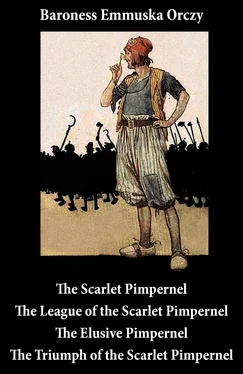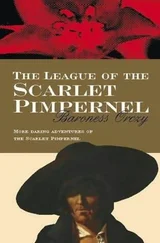Sir Percy, whose chief interest in most social gatherings seemed to centre round the card-table, usually allowed his wife to flirt, dance, to amuse or bore herself as much as she liked. And to-night, having delivered himself of his BON MOT, he had left Marguerite surrounded by a crowd of admirers of all ages, all anxious and willing to help her to forget that somewhere in the spacious reception rooms, there was a long, lazy being who had been fool enough to suppose that the cleverest woman in Europe would settle down to the prosaic bonds of English matrimony.
Her still overwrought nerves, her excitement and agitation, lent beautiful Marguerite Blakeney much additional charm: escorted by a veritable bevy of men of all ages and of most nationalities, she called forth many exclamations of admiration from everyone as she passed.
She would not allow herself any more time to think. Her early, somewhat Bohemian training had made her something of a fatalist. She felt that events would shape themselves, that the directing of them was not in her hands. From Chauvelin she knew that she could expect no mercy. He had set a price on Armand's head, and left it to her to pay or not, as she chose.
Later on in the evening she caught sight of Sir Andrew Ffoulkes and Lord Antony Dewhurst, who seemingly had just arrived. She noticed at once that Sir Andrew immediately made for little Suzanne de Tournay, and that the two young people soon managed to isolate themselves in one of the deep embrasures of the mullioned windows, there to carry on a long conversation, which seemed very earnest and very pleasant on both sides.
Both the young men looked a little haggard and anxious, but otherwise they were irreproachably dressed, and there was not the slightest sign, about their courtly demeanour, of the terrible catastrophe, which they must have felt hovering round them and round their chief.
That the League of the Scarlet Pimpernel had no intention of abandoning its cause, she had gathered through little Suzanne herself, who spoke openly of the assurance she and her mother had had that the Comte de Tournay would be rescued from France by the league, within the next few days. Vaguely she began to wonder, as she looked at the brilliant and fashionable in the gaily-lighted ball-room, which of these worldly men round her was the mysterious "Scarlet Pimpernel," who held the threads of such daring plots, and the fate of valuable lives in his hands.
A burning curiosity seized her to know him: although for months she had heard of him and had accepted his anonymity, as everyone else in society had done; but now she longed to know—quite impersonally, quite apart from Armand, and oh! quite apart from Chauvelin—only for her own sake, for the sake of the enthusiastic admiration she had always bestowed on his bravery and cunning.
He was at the ball, of course, somewhere, since Sir Andrew Ffoulkes and Lord Antony Dewhurst were here, evidently expecting to meet their chief—and perhaps to get a fresh MOT D'ORDRE from him.
Marguerite looked round at everyone, at the aristocratic high-typed Norman faces, the squarely-built, fair-haired Saxon, the more gentle, humorous caste of the Celt, wondering which of these betrayed the power, the energy, the cunning which had imposed its will and its leadership upon a number of high-born English gentlemen, among whom rumour asserted was His Royal Highness himself.
Sir Andrew Ffoulkes? Surely not, with his gentle blue eyes, which were looking so tenderly and longingly after little Suzanne, who was being led away from the pleasant TETE-A-TETE by her stern mother. Marguerite watched him across the room, as he finally turned away with a sigh, and seemed to stand, aimless and lonely, now that Suzanne's dainty little figure had disappeared in the crowd.
She watched him as he strolled towards the doorway, which led to a small boudoir beyond, then paused and leaned against the framework of it, looking still anxiously all round him.
Marguerite contrived for the moment to evade her present attentive cavalier, and she skirted the fashionable crowd, drawing nearer to the doorway, against which Sir Andrew was leaning. Why she wished to get closer to him, she could not have said: perhaps she was impelled by an all-powerful fatality, which so often seems to rule the destinies of men.
Suddenly she stopped: her very heart seemed to stand still, her eyes, large and excited, flashed for a moment towards that doorway, then as quickly were turned away again. Sir Andrew Ffoulkes was still in the same listless position by the door, but Marguerite had distinctly seen that Lord Hastings—a young buck, a friend of her husband's and one of the Prince's set—had, as he quickly brushed past him, slipped something into his hand.
For one moment longer—oh! it was the merest flash—Marguerite paused: the next she had, with admirably played unconcern, resumed her walk across the room—but this time more quickly towards that doorway whence Sir Andrew had now disappeared.
All this, from the moment that Marguerite had caught sight of Sir Andrew leaning against the doorway, until she followed him into the little boudoir beyond, had occurred in less than a minute. Fate is usually swift when she deals a blow.
Now Lady Blakeney had suddenly ceased to exist. It was Marguerite St. Just who was there only: Marguerite St. Just who had passed her childhood, her early youth, in the protecting arms of her brother Armand. She had forgotten everything else—her rank, her dignity, her secret enthusiasms—everything save that Armand stood in peril of his life, and that there, not twenty feet away from her, in the small boudoir which was quite deserted, in the very hands of Sir Andrew Ffoulkes, might be the talisman which would save her brother's life.
Barely another thirty seconds had elapsed between the moment when Lord Hastings slipped the mysterious "something" into Sir Andrew's hand, and the one when she, in her turn, reached the deserted boudoir. Sir Andrew was standing with his back to her and close to a table upon which stood a massive silver candelabra. A slip of paper was in his hand, and he was in the very act of perusing its contents.
Unperceived, her soft clinging robe making not the slightest sound upon the heavy carpet, not daring to breathe until she had accomplished her purpose, Marguerite slipped close behind him. . . . At that moment he looked round and saw her; she uttered a groan, passed her hand across her forehead, and murmured faintly:
"The heat in the room was terrible . . . I felt so faint . . . Ah! . . ."
She tottered almost as if she would fall, and Sir Andrew, quickly recovering himself, and crumpling in his hand the tiny note he had been reading, was only apparently, just in time to support her.
"You are ill, Lady Blakeney?" he asked with much concern, "Let me . . ."
"No, no, nothing—" she interrupted quickly. "A chair—quick."
She sank into a chair close to the table, and throwing back her head, closing her eyes.
"There!" she murmured, still faintly; "the giddiness is passing off. . . . Do not heed me, Sir Andrew; I assure you I already feel better."
At moments like these there is no doubt—and psychologists actually assert it—that there is in us a sense which has absolutely nothing to do with the other five: it is not that we see, it is not that we hear or touch, yet we seem to do all three at once. Marguerite sat there with her eyes apparently closed. Sir Andrew was immediately behind her, and on her right was the table with the five-armed candelabra upon it. Before her mental vision there was absolutely nothing but Armand's face. Armand, whose life was in the most imminent danger, and who seemed to be looking at her from a background upon which were dimly painted the seething crowd of Paris, the bare walls of the Tribunal of Public Safety, with Foucquier-Tinville, the Public Prosecutor, demanding Armand's life in the name of the people of France, and the lurid guillotine with its stained knife waiting for another victim . . . Armand! . . .
Читать дальше












